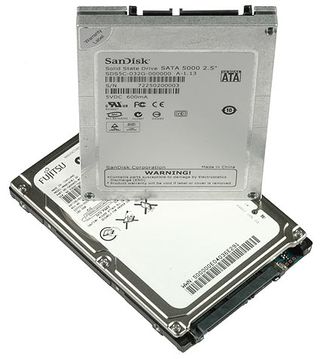The Terabyte Battle
Where Does The Hard Drive Go From Here?

Flash or Hybrid Hard Drives will increasingly challenge conventional hard drives - but not at high capacities.
This is a rather interesting question, as there have been several developments that clearly blur the future of mass storage. On the one hand, there have always been so-called "solid state" drives. Traditionally, these have been hard-drive-like products created with silicon memory and some sort of battery buffer. These products are extremely fast, but they're likewise expensive and exclusive, and so not suitable for the mainstream. But there are two technologies threatening the traditional hard drive domain: Flash hard drives, which are based on non-volatile Flash memory, and so-called hybrid hard drives (H-HDDs). The latter are traditional hard drives that also have an additional Flash memory bank that can be used to store OEM application data or frequently used operating system files.
Hybrid hard drives are meant to speed up system startup by reading from the Flash memory instead of the slower mechanical medium. The latter can also be disabled when the hard drive isn't required to spin. Flash hard drives such as the SATA5000 by Sandisk aim to replace all moving parts by fundamentally faster Flash memory lineups, which became an option due to continuously increasing Flash data densities.
However, hybrid hard drives suffer from immature operating system support. At this point, hybrid hard drives do not deliver substantial benefits, whether in the form of longer battery runtime for notebooks (the hard drive spindle motor can be shut down as long as the hybrid hard drive operates with its Flash memory) or by delivering better performance. At the same time, buying a hybrid hard drive instead of a conventional one certainly isn't a bad thing. It is certainly the way hard drives are going, but it will take time once they're supported before they finally make some sense.
Flash hard drives will get better and better with every generation. While early models are limited to 32 GB for cost reasons, and they still haven't beat the conventional hard drive in many benchmark segments, the upcoming generation will deliver data rates that compete with the latest 7,200 RPM desktop drives. The only issue that cannot be solved by smart engineering is data density: Flash hard drives will be limited to 64 and 128 GB for the time being - unless you're willing to spend four digit amounts on a hard drive that still won't even hold as much as current notebook drives at 250 GB. But accelerated Flash technologies will eventually find their way into Hybrid Hard Drives.
Stay on the Cutting Edge
Join the experts who read Tom's Hardware for the inside track on enthusiast PC tech news — and have for over 25 years. We'll send breaking news and in-depth reviews of CPUs, GPUs, AI, maker hardware and more straight to your inbox.
Current page: Where Does The Hard Drive Go From Here?
Prev Page Seagate Barracuda 7200.11 Joins The Terabyte Club Next Page Seagate Barracuda 7200.11 - ST31000340AS (1 TB)-
andy_newton The Barracuda gets bricked after 6 months of use. While Seagate is kind enough to offer a free recovery, I lost 3 weeks of my time waiting. Upon receiving its unbricked with new firmware, the performance has now become terribly slow. It is very much different from the last moments before it got bricked.Reply
I contacted the customer service again and they give me a B.S. regarding this particular hard drive is not suitable foe use as external Drive.
I am both terribly surprised and disappointed that tomshardware did not amend any article regarding its performance (post recovery), since those performance charts with its defective firmware should be invalid.
Instead, Tomshardware continues to praise this hard drive and claims that in toms lab the bricking can not be repeated.
I am wondering how much money that seagate pays toms to shut up and not to publish any honest review regarding this other affected hard drives.
Or is it just me (again) waking up in a parallel universe where Seagate has never built any drives with defective firmware.
-ND -
flagoman mmm, you are out of place on your comments, here, couse i dont think that toms would be able to test any hardware for 6 months or until it fails. imagine how late every review would be delayed, its ridiculous,what you are asking what are you six years old??? shezzz... And the company offer you a recovery of the info of your hdd,and actually i found that a great plus, Seagate. but you should had take your info out, and buy a new one.Reply
Most Popular

